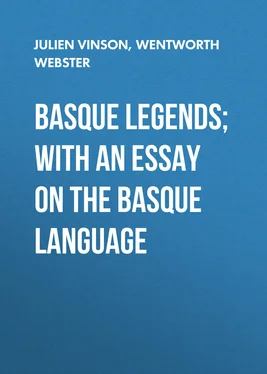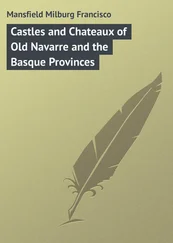Julien Vinson - Basque Legends; With an Essay on the Basque Language
Здесь есть возможность читать онлайн «Julien Vinson - Basque Legends; With an Essay on the Basque Language» — ознакомительный отрывок электронной книги совершенно бесплатно, а после прочтения отрывка купить полную версию. В некоторых случаях можно слушать аудио, скачать через торрент в формате fb2 и присутствует краткое содержание. Жанр: foreign_antique, Старинная литература, Мифы. Легенды. Эпос, на английском языке. Описание произведения, (предисловие) а так же отзывы посетителей доступны на портале библиотеки ЛибКат.
- Название:Basque Legends; With an Essay on the Basque Language
- Автор:
- Жанр:
- Год:неизвестен
- ISBN:нет данных
- Рейтинг книги:3 / 5. Голосов: 1
-
Избранное:Добавить в избранное
- Отзывы:
-
Ваша оценка:
- 60
- 1
- 2
- 3
- 4
- 5
Basque Legends; With an Essay on the Basque Language: краткое содержание, описание и аннотация
Предлагаем к чтению аннотацию, описание, краткое содержание или предисловие (зависит от того, что написал сам автор книги «Basque Legends; With an Essay on the Basque Language»). Если вы не нашли необходимую информацию о книге — напишите в комментариях, мы постараемся отыскать её.
Basque Legends; With an Essay on the Basque Language — читать онлайн ознакомительный отрывок
Ниже представлен текст книги, разбитый по страницам. Система сохранения места последней прочитанной страницы, позволяет с удобством читать онлайн бесплатно книгу «Basque Legends; With an Essay on the Basque Language», без необходимости каждый раз заново искать на чём Вы остановились. Поставьте закладку, и сможете в любой момент перейти на страницу, на которой закончили чтение.
Интервал:
Закладка:
“If you do not find me here on your return, you will have to wear out seven pairs of shoes, six of leather and one pair of iron ones (before you will be able to find me).”
When she came home, her father would not let her go back to the house where she had passed such a long time with a son of a king, condemned to be a serpent. She said that his time was almost finished, and that in gratitude she ought to return; that he had said that he would marry her. The father had her put in prison, confined in a room very high up. The fourth day she escaped, and went to the place, but she did not find the king’s son. She had already shoes on her feet. She had almost worn them out. After that she bought another pair. She kept journeying on and on, and asking if it were far, and they told her that it was very far. She bought still another pair of shoes, and these, too, got worn out on the road. She bought a fifth pair, and after them the sixth also. She then asked if she were near yet, and they told her that she was still very far. Then she bought the seventh pair of shoes, of iron. And when she had gone a short way in these shoes, she asked if it were far from there to the son of the king. The seventh pair of shoes were almost worn out when she came to a city, and heard sounds of music. She inquired what was happening in the city.
“Such a king’s son is being married to-day.”
She went to the house, and knocked at the door. A servant came.
“What do you want?”
She asked if there were any work to spin, and she would spin it.
And the servant went to tell it to the mistress. The lady ordered the servant to bring her in. She brought her in. And when she was in the kitchen, she showed the silk handkerchief which the king’s son had given her; and she began to blow her nose with that. The lady was quite astonished to see the girl blow her nose with such a beautiful handkerchief, as if it were nothing, 35 35 Silk kerchiefs are generally used, especially by women, as head-dresses, and not as pocket-handkerchiefs, all through the south of France.
when her son had one just like it for his marriage-day. So she told her son, when he came back from the church, that she had a spinster who came from a great distance, and said to him:
“She has a silk handkerchief just like yours!”
And the king’s son said to his mother:
“I, too, must see this spinster that you have there.” And he began to go there.
And his mother said to him,
“But why must you see her?”
“I wish to see her.”
He went to the kitchen, and in his presence she used her silk handkerchief.
He said to her,
“Show me that.”
She said to him,
“It is too dirty to put into your hands, sir.”
The gentleman says to her,
“I wish to see it, and show it to me.”
(Then) he recognised the young girl. She showed him (too) the distaff and spindle.
At table, when everybody was engaged telling stories, this king said:
“I also have a story to tell.”
Everybody was silent, and turned to look at him, and he said:
“Formerly, I had a key to a chest of drawers, and I lost it, and had a new one made. (After that, I found the old one.)”
And he turned to his wife:
“Should I use the old one or the new one?”
And she replied:
“If the first was a good one, why should you make use of the new one?”
Then he gave her this answer:
“Formerly, I had a wife, and now I have taken you. I leave you, and take the former one. Do you go off, then, to your own house.”
Gagna-haurra Hirigaray.
(Learnt at Guethary.)
For the version of the Heren-Suge tales which most closely approaches the Gaelic, see below, “Keltic Legends,” “The Fisherman and his Sons,” p. 87.
III.—Animal Tales
We give two stories as specimens of animal tales, which are neither allegories, nor fables, and still less satires. The reader must remember the phrase, “This happened when animals and all things could talk.” So thoroughly is this believed, that the first tale of this class recited to us completely puzzled us. The animals are in them placed so fully on a footing with human beings—not in the least as our “poor relations,” but rather as sharper-witted, and quite as happy and well off as ourselves—that it is difficult at times to determine whether it is the beast or the man who is the speaker.
Of the latter part of our first story we have heard many variations. In one given by M. Cerquand, p. 29, note, 36 36 “Légendes et Récits Populaires du Pays Basque,” par M. Cerquand. Part I., Pau, 1875, and Part II., p.28, Pau, 1876.
the fox is represented by Basa-Jauna; in a version from Baigorry, by the Tartaro; but in three others, from separate localities, he is a fox. The first two truths are the same in all the versions. In that here given, the fun is heightened by the fox talking and lisping throughout like a little child. All these versions we take to be merely fragments of a much longer story.
In M. Cerquand’s “The Chandelier of St. Sauveur,” p. 22, the hero’s name is Acherihargaix—“the fox difficult to be caught;” and we suspect that he, too, was originally merely an animal.
Acheria, the Fox
One day a fox was hungry. He did not know what to think. He saw a shepherd pass every day with his flock, and he said to himself that he ought to steal his milk and his cheese, and to have a good feast; but he needed some one to help him in order to effect anything. So he goes off to find a wolf, and he says to him,
“Wolf, wolf! we ought to have a feast with such a shepherd’s milk and cheese. You, you shall go to where the flocks are feeding, and from a distance you must howl, ‘Uhur, uhur, uhur.’ The man, after having milked his sheep, drives them into the field, with his dog, very early in the morning, and he stops at home to do his work, and then he makes his cheese; and, when you have begun to howl ‘Uhur, uhur,’ and the dog to bark, the shepherd will leave everything else, and will go off full speed. During this time I will steal the milk, and we will share it when you come to me.”
The wolf agreed to have a feast, and set out. He did just what the fox had told him. The dog began to bark when the wolf approached. And when the man heard that he went off, leaving everything, and our fox goes and steals the vessel in which the curdled milk was. What does he do then, before the arrival of the wolf? He gently, gently takes off the cream, thinly, thinly, and he eats all the contents of the jug. After he has eaten all, he fills it up with dirt, and puts back the cream on the top, and he awaits the wolf at the place where he had told him. The fox says to him, since it is he who is to make the division, that as the top is much better than the underneath part, the one who should choose that should have only that, and the other all the rest. “Choose now which you would like.”
The wolf says to him,
“I will not have the top; I prefer what is at the bottom.”
The fox then takes the top, and gives the poor wolf the vessel full of dirt. 37 37 Cf. Campbell’s tale, “The Keg of Butter,” Vol. III., 98, where the fox cheats the wolf by giving him the bottoms of the oats and the tops of the potatoes. See also the references there given.
When he saw that, the wolf got angry; but the fox said to him,
“It is not my fault. Apparently the shepherd makes it like that.”
And the fox goes off well filled.
Another day he was again very hungry, and did not know what to contrive. Every day he saw a boy pass by on the road with his father’s dinner. He says to a blackbird,
“Blackbird, you don’t know what we ought to do? We ought to have a good dinner. A boy will pass by here directly. You will go in front of him, and when the boy goes to catch you, you will go on a little farther, limping, and when you shall have done that a little while the boy will get impatient, and he will put down his basket in order to catch you quicker. I will take the basket, and will go to such a spot, and we will share it, and will make a good dinner.”
Читать дальшеИнтервал:
Закладка:
Похожие книги на «Basque Legends; With an Essay on the Basque Language»
Представляем Вашему вниманию похожие книги на «Basque Legends; With an Essay on the Basque Language» списком для выбора. Мы отобрали схожую по названию и смыслу литературу в надежде предоставить читателям больше вариантов отыскать новые, интересные, ещё непрочитанные произведения.
Обсуждение, отзывы о книге «Basque Legends; With an Essay on the Basque Language» и просто собственные мнения читателей. Оставьте ваши комментарии, напишите, что Вы думаете о произведении, его смысле или главных героях. Укажите что конкретно понравилось, а что нет, и почему Вы так считаете.












